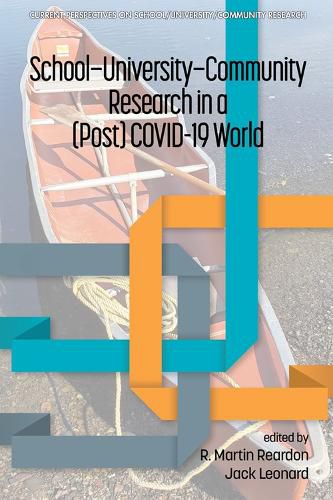Readings Newsletter
Become a Readings Member to make your shopping experience even easier.
Sign in or sign up for free!
You’re not far away from qualifying for FREE standard shipping within Australia
You’ve qualified for FREE standard shipping within Australia
The cart is loading…






This title is printed to order. This book may have been self-published. If so, we cannot guarantee the quality of the content. In the main most books will have gone through the editing process however some may not. We therefore suggest that you be aware of this before ordering this book. If in doubt check either the author or publisher’s details as we are unable to accept any returns unless they are faulty. Please contact us if you have any questions.
The American Psychological Association (2020) reported that some 81% of teenage children (13 to 17 years-of-age) were negatively impacted in a range of ways due to school closures in connection with COVID-19, including 47% who indicated that they "didn't learn as much as they did in previous years" (para. 21). That perhaps many more than 47% of teenage children in the United States did not learn as much as they did in previous years was documented in the most recent National Assessment of Educational Progress (NAEP) report which found that "the national average score declines in mathematics for fourth- and eighth-graders were the largest ever recorded in that subject" (Wilburn & Elias, 2022, para. 1). The National Center for Educational Statistics Commissioner commented somewhat hyperbolically that the results showed that "every student was vulnerable to the pandemic's disruptions" (Wilburn & Elias, 2022, para. 5) and called for a single-minded emphasis on ways to assist students to recover from their trauma and accelerate their learning. Wilburn and Elias (2022) joined those who have pointed out that the learning declines associated with COVID-19 did not occur equitably. The likelihood of a single-minded policy response to change the system and address the achievement gaps exposed by the range of responses to COVID-19 seems small. On the one hand, doubting the sustainability of innovative responses, education historian Larry Cuban referenced the dominant stability of schooling which, if anything, "produces this huge public and professional need to resume schooling as it was" (Young, 2022, para. 18). On the other hand, diverse political agendas will diffuse concerted efforts. Grossman et al. (2021) discussed a pertinent example from Michigan where "public health data, partisanship, and collective bargaining" (p. 637) each played a role in determining school reopening decisions. On this same issue of school reopening, there is credible evidence from Massachusetts that the much maligned and politically explosive masking policies implemented in some schools may have saved lives (Cowger et al., 2022). Roy (2020) asserted that "historically, pandemics have forced humans to break with the past and imagine their world anew. This one is no different. It is a portal, a gateway between one world and the next" (para. 48). The chapters in this volume attest to the willingness of individuals to collaborate in stepping through that portal.
$9.00 standard shipping within Australia
FREE standard shipping within Australia for orders over $100.00
Express & International shipping calculated at checkout
This title is printed to order. This book may have been self-published. If so, we cannot guarantee the quality of the content. In the main most books will have gone through the editing process however some may not. We therefore suggest that you be aware of this before ordering this book. If in doubt check either the author or publisher’s details as we are unable to accept any returns unless they are faulty. Please contact us if you have any questions.
The American Psychological Association (2020) reported that some 81% of teenage children (13 to 17 years-of-age) were negatively impacted in a range of ways due to school closures in connection with COVID-19, including 47% who indicated that they "didn't learn as much as they did in previous years" (para. 21). That perhaps many more than 47% of teenage children in the United States did not learn as much as they did in previous years was documented in the most recent National Assessment of Educational Progress (NAEP) report which found that "the national average score declines in mathematics for fourth- and eighth-graders were the largest ever recorded in that subject" (Wilburn & Elias, 2022, para. 1). The National Center for Educational Statistics Commissioner commented somewhat hyperbolically that the results showed that "every student was vulnerable to the pandemic's disruptions" (Wilburn & Elias, 2022, para. 5) and called for a single-minded emphasis on ways to assist students to recover from their trauma and accelerate their learning. Wilburn and Elias (2022) joined those who have pointed out that the learning declines associated with COVID-19 did not occur equitably. The likelihood of a single-minded policy response to change the system and address the achievement gaps exposed by the range of responses to COVID-19 seems small. On the one hand, doubting the sustainability of innovative responses, education historian Larry Cuban referenced the dominant stability of schooling which, if anything, "produces this huge public and professional need to resume schooling as it was" (Young, 2022, para. 18). On the other hand, diverse political agendas will diffuse concerted efforts. Grossman et al. (2021) discussed a pertinent example from Michigan where "public health data, partisanship, and collective bargaining" (p. 637) each played a role in determining school reopening decisions. On this same issue of school reopening, there is credible evidence from Massachusetts that the much maligned and politically explosive masking policies implemented in some schools may have saved lives (Cowger et al., 2022). Roy (2020) asserted that "historically, pandemics have forced humans to break with the past and imagine their world anew. This one is no different. It is a portal, a gateway between one world and the next" (para. 48). The chapters in this volume attest to the willingness of individuals to collaborate in stepping through that portal.